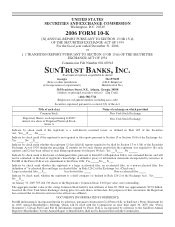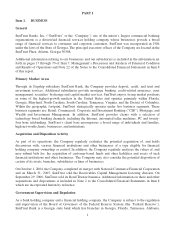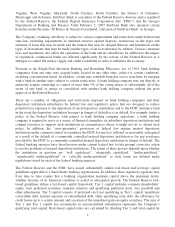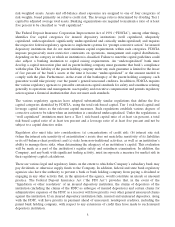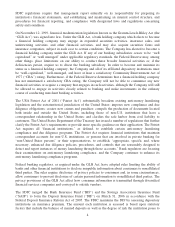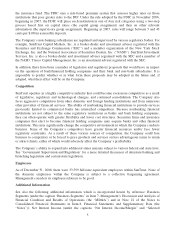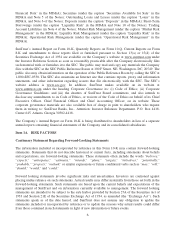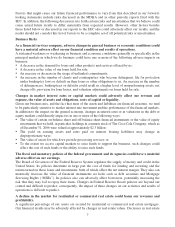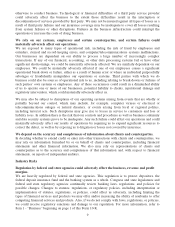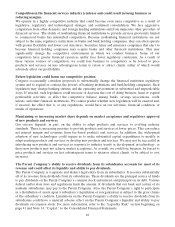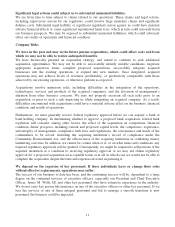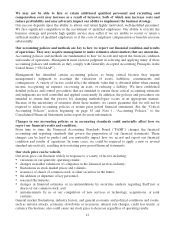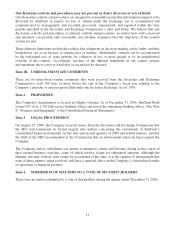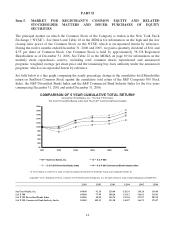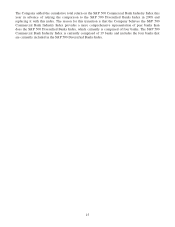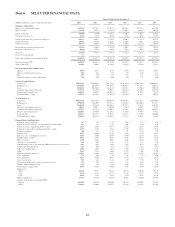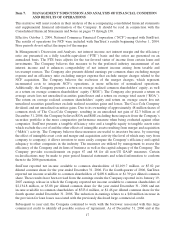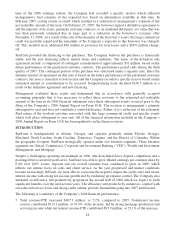SunTrust 2006 Annual Report Download - page 22
Download and view the complete annual report
Please find page 22 of the 2006 SunTrust annual report below. You can navigate through the pages in the report by either clicking on the pages listed below, or by using the keyword search tool below to find specific information within the annual report.otherwise to conduct business. Technological or financial difficulties of a third party service provider
could adversely affect the business to the extent those difficulties result in the interruption or
discontinuation of services provided by that party. We may not be insured against all types of losses as a
result of third party failures and our insurance coverage may be inadequate to cover all losses resulting
from system failures or other disruptions. Failures in the business infrastructure could interrupt the
operations or increase the costs of doing business.
We rely on our systems, employees and certain counterparties, and certain failures could
materially adversely affect our operations.
We are exposed to many types of operational risk, including the risk of fraud by employees and
outsiders, clerical and record-keeping errors, and computer/telecommunications systems malfunctions.
Our businesses are dependent on our ability to process a large number of increasingly complex
transactions. If any of our financial, accounting, or other data processing systems fail or have other
significant shortcomings, we could be materially adversely affected. We are similarly dependent on our
employees. We could be materially adversely affected if one of our employees causes a significant
operational break-down or failure, either as a result of human error or where an individual purposefully
sabotages or fraudulently manipulates our operations or systems. Third parties with which we do
business could also be sources of operational risk to us, including relating to break-downs or failures of
such parties’ own systems or employees. Any of these occurrences could result in a diminished ability
of us to operate one or more of our businesses, potential liability to clients, reputational damage and
regulatory intervention, which could materially adversely affect us.
We may also be subject to disruptions of our operating systems arising from events that are wholly or
partially beyond our control, which may include, for example, computer viruses or electrical or
telecommunications outages or natural disasters, or events arising from local or regional politics,
including terrorist acts. Such disruptions may give rise to losses in service to customers and loss or
liability to us. In addition there is the risk that our controls and procedures as well as business continuity
and data security systems prove to be inadequate. Any such failure could affect our operations and could
materially adversely affect our results of operations by requiring us to expend significant resources to
correct the defect, as well as by exposing us to litigation or losses not covered by insurance.
We depend on the accuracy and completeness of information about clients and counterparties.
In deciding whether to extend credit or enter into other transactions with clients and counterparties, we
may rely on information furnished by or on behalf of clients and counterparties, including financial
statements and other financial information. We also may rely on representations of clients and
counterparties as to the accuracy and completeness of that information and, with respect to financial
statements, on reports of independent auditors.
Industry Risks
Regulation by federal and state agencies could adversely affect the business, revenue and profit
margins.
We are heavily regulated by federal and state agencies. This regulation is to protect depositors, the
federal deposit insurance fund and the banking system as a whole. Congress and state legislatures and
federal and state regulatory agencies continually review banking laws, regulations, and policies for
possible changes. Changes to statutes, regulations, or regulatory policies, including interpretation or
implementation of statutes, regulations, or policies, could affect us adversely, including limiting the
types of financial services and products we may offer and/or increasing the ability of nonbanks to offer
competing financial services and products. Also, if we do not comply with laws, regulations, or policies,
we could receive regulatory sanctions and damage to our reputation. For more information, refer to
Item 1 - “Business” beginning on page 1 of this Form 10-K.
9



